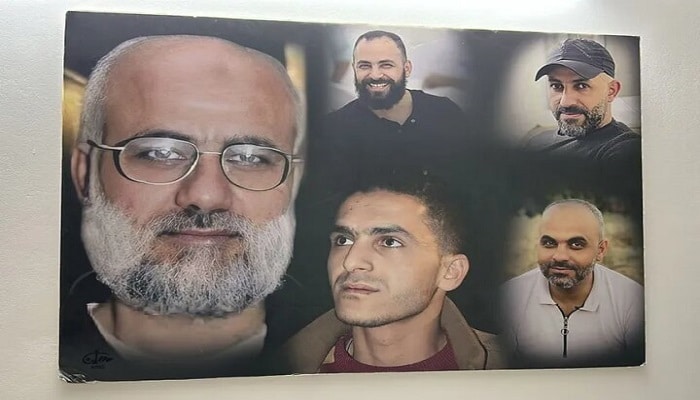PNN – Prominent Palestinian prisoners, including Sheikh Jamal, whom the Zionist regime fears will become resistance commanders if released, are a generation whose spirit cannot be broken by long years of imprisonment.
According to the report of Pakistan News Network, citing Al Jazeera, Following the release of Zionist prisoners from Gaza, nearly 2,000 Palestinians were released from Zionist prisons, dozens of whom were people who participated in anti-Zionist operations and had been sentenced to long prison terms. However, some prisoners are still denied freedom due to the opposition of the Zionist regime.
Who is Jamal Abu Al-Hija?
According to Al Jazeera, Jamal Abu Al-Hija is one of these prisoners, who has been held in Israeli prisons for 24 years. Abu Al-Hija, whose family was displaced from the village of Ain Hawz in the Haifa region after the 1948 Nakba, was born in 1959 in the Jenin camp. He graduated in Arabic and worked as an Arabic teacher in Saudi Arabia and Yemen for about 10 years, then returned to a refugee camp in occupied Palestine.
Read more:
Israel Hume reports: Prominent Palestinian prisoners to be released in exchange
Abu al-Hija was arrested several times by the Israeli regime. By the beginning of the Second Palestinian Intifada (2000-2005) and the attack on Jenin in 2002, he was one of the military commanders of the Izz ad-Din al-Qassam Brigades, the military wing of the Islamic resistance movement Hamas. He was arrested by the Zionist occupiers that same year and sentenced to nine life sentences on charges of killing several Zionists in martyrdom operations and commanding the Qassam Brigades.
This Qassam prisoner has six children, three of whom, Asim, Abdul Salam, and Imad, are also in Israeli prisons. Hamza, another son of Jamal, was martyred by the Israeli regime in 2014 at the age of 21. Banan, one of Jamal Abu Al-Hija’s daughters, is also in an Israeli prison, and Sajida, another daughter of Jamal, is the only member of the family who is outside the Israeli prison after her mother’s death a few months ago.
Sajida says: The last time I saw my father was about 5 years ago. Sajida was a 6-year-old child when the Zionist soldiers raided their house. She says that the Zionists used to raid the house at night to capture “Sheikh Jamal”. They even interrogated his young children. Once, they took him and his brother Hamza aside and tried to trick them into giving them information about their father using sweets.
Despite 24 years of captivity, Abu Al-Hija remains one of the most prominent figures in Jenin and a symbol of the Palestinian freedom movement. The long captivity has not weakened his spirit or isolated him, but has made him stronger, to the point that his fellow prisoner, Rabi’ Al-Barghouthi, describes him as “a mountain of patience.”
Sajida says that her father never complained and, despite losing his hand in the Second Intifada, the repeated arrests of his children, and the death of his wife, he always thanked God. He was always full of peace, even in prison.
Abu Al-Hija is also respected by everyone in prison. “Sheikh Jamal” has never been seen insulting anyone or getting angry. All Palestinian prisoners consider him a model of patience and stability.
Despite the Zionists’ opposition to the release of Jamal Abu Al-Hija, his family continues to live in a state of mixed hope and faith. Sheikh Abu Al-Hija’s story is a living example of the suffering of long-time prisoners who have been detained for two decades or more and whose release is still stubbornly denied by the occupiers. This is especially true of the icons of the prisoners’ movement, including individuals such as Abbas al-Sayyid, Marwan al-Barghouthi, Hassan Salameh, Ahmed Saadat, Ibrahim Hamed, and Muammar Shahrour.
The families of these prisoners emphasize that the Zionist regime deliberately excludes them from exchange lists because it considers them “influential individuals capable of rebuilding the organizational structure of the resistance” if released, which makes their names always present in negotiations and absent from the final lists.
Sheikh Jamal stands as a symbol of the resilience of Palestinian prisoners and a symbol of an entire generation whose spirit has not been broken by prisons despite a quarter of a century of detention.

